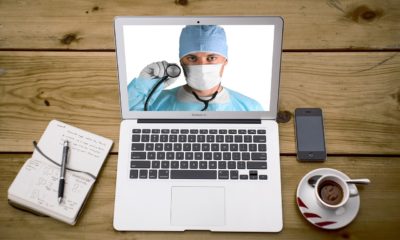Biotech
Approxima Closes a €1.6 Million Capital Increase
Tricuspid regurgitation is a condition that affects more than 13 million patients worldwide and represents an unmet clinical need in an increasingly aging society. In more than 70 percent of cases, tricuspid regurgitation is related to dilatation of the right ventricle causing dislocation of the papillary muscle and leading to jamming of the tricuspid valve leaflets.

Approxima, a MedTech startup founded in 2020 as a spin-off from the Milan Polytechnic, has closed a €1.6 million seed round of financing. The company’s mission is to develop a minimally invasive tricuspid valve repair system based on a right ventricle remodeling approach for the treatment of patients with tricuspid regurgitation. The company was founded by CEO Michal Jaworek, Edoardo Maroncelli, and two scientific advisors from Politecnico di Milano, Riccardo Vismara and Gianfranco Beniamino Fiore.
The seed round was led by Panakès Partners together with the Investors Club and other business angels, including Barbara Taddei and Carlo Alberto Marcoaldi. The funds raised will be used to further advance the technology through preclinical testing and toward clinical trials.
Read more about Approxima and find the latest financial news of the day with the Born2Invest mobile app.
What is tricuspid regurgitation?
Tricuspid regurgitation is a condition that affects more than 13 million patients worldwide and represents an unmet clinical need in an increasingly aging society. In more than 70 percent of cases, tricuspid regurgitation is related to dilatation of the right ventricle causing dislocation of the papillary muscle and leading to jamming of the tricuspid valve leaflets.
Patients are generally frail, often hospitalized, with poor quality of life, and the condition has a 50% mortality rate. Chronic volume and pressure overload progress to right heart failure, which worsens the prognosis. Today, 99% of patients with tricuspid regurgitation are denied open heart surgery because of the high mortality risk.
New board members
The MedTech startup has also recruited key new board members with extensive experience in the field. Paolo Denti, a cardiac surgeon at San Raffaele Hospital in Milan and a member of the Pcr Tricuspid Focus Group, the European Society of Cardiothoracic Surgery, the European Society of Cardiology, and the European and Italian Societies of Interventional Cardiology, was appointed as CMO. An expert in minimally invasive cardiac surgery and a practitioner in percutaneous technologies in the aortic, mitral, and tricuspid areas, he has collaborated as principal investigator on several clinical trials. During his career, he has contributed to preclinical development and has been an operator in first-in-human trials of innovative percutaneous technologies (e.g., Tricinch, Saturn, and Mitral Shortcut).
Umberto Pasquali was instead appointed chairman of the board. He has more than 20 years of experience in business development, project management, operations, and finance in the medical device field gained in executive-level positions at Lima Corporate and LivaNova. “I am excited about Approxima’s unique technology,” said Umberto Pasquali, “which gets to the root of the problem by addressing the ventricular dilatation rather than the pathology (tricuspid regurgitation). With the minimally invasive implantation, postoperative adjustment features, and a small footprint, we believe the Approxima device could become a treatment of choice for the 13 million people worldwide who are affected by at least moderate Tr and who, for the vast majority (>99 %), are untreated.”
Finally, Barbara Castellano will join the board as a director, representing Panakès Partners. Barbara has a wealth of experience in the cardiovascular industry and extensive knowledge of the medical device industry, gained from working as director of Clinical Affairs, Certifications, Registrations, and Quality Assurance at CID SpA (now Alvimedica) and as Business Development and Global marketing director for heart valves at Sorin (now LivaNova).
__
(Featured image by kaboompics via Pixabay)
DISCLAIMER: This article was written by a third party contributor and does not reflect the opinion of Born2Invest, its management, staff or its associates. Please review our disclaimer for more information.
This article may include forward-looking statements. These forward-looking statements generally are identified by the words “believe,” “project,” “estimate,” “become,” “plan,” “will,” and similar expressions. These forward-looking statements involve known and unknown risks as well as uncertainties, including those discussed in the following cautionary statements and elsewhere in this article and on this site. Although the Company may believe that its expectations are based on reasonable assumptions, the actual results that the Company may achieve may differ materially from any forward-looking statements, which reflect the opinions of the management of the Company only as of the date hereof. Additionally, please make sure to read these important disclosures.
First published in StartupItalia, a third-party contributor translated and adapted the article from the original. In case of discrepancy, the original will prevail.
Although we made reasonable efforts to provide accurate translations, some parts may be incorrect. Born2Invest assumes no responsibility for errors, omissions or ambiguities in the translations provided on this website. Any person or entity relying on translated content does so at their own risk. Born2Invest is not responsible for losses caused by such reliance on the accuracy or reliability of translated information. If you wish to report an error or inaccuracy in the translation, we encourage you to contact us.

-

 Markets3 days ago
Markets3 days agoCotton Market Weakens Amid Demand Concerns and Bearish Trends
-

 Crypto1 week ago
Crypto1 week agoIs Strategy’s Bitcoin Bet Becoming a Dangerous House of Cards?
-

 Fintech1 day ago
Fintech1 day agoFintech Alliances and AI Expand Small-Business Lending Worldwide
-

 Crowdfunding1 week ago
Crowdfunding1 week agoSpain’s Real Estate Crowdfunding Boom: Opportunity, Access, and Hidden Risks














